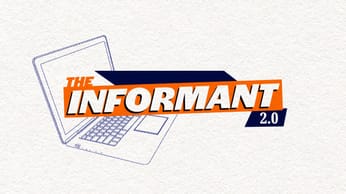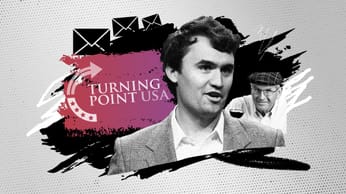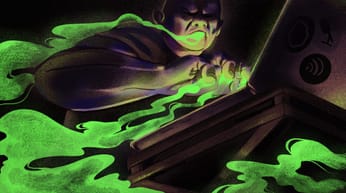
Cantwell Trial Day 4: So much Cantwell
The neo-Nazi podcaster’s second day on the stand was as tearful and bizarre as his first. His fate now rests in the hands of the jury.
CONCORD, NEW HAMPSHIRE — The fourth day of testimony in the federal criminal case against neo-Nazi podcaster Christopher Cantwell began with him still on the stand, and ended with closing arguments and the start of jury deliberations. Here are highlights from the last day of testimony in this never dull, jam-packed trial!
Previous coverage:
- How Christopher Cantwell crumbled
- Cantwell Trial Day 1: Names get named
- Cantwell Trial Day 2: Bowl Patrol under oath
- Cantwell Trial Day 3: Nazi tears
1. More Nazi tears
The final day of testimony began with Cantwell back on the stand, continuing direct examination by defense attorney Eric Wolpin.
Cantwell spent a decent part of the morning discussing the mean things that were being said about him online in the weeks and months leading up to his June 2019 Telegram exchange with Benjamin Lambert, the neo-Nazi known as “CheddarMane” who is also the alleged victim in the case. The charges against Cantwell center around whether he used that exchange to threaten and attempt to extort Lambert, who was a member of an online neo-Nazi group called the Bowl Patrol, which was feuding with Cantwell.
“Calling me a junkie loser was a class of defamatory comments these guys were making,” Cantwell testified, before speaking at length about the nonstop flood of memes of which he was the subject.
“I’ve seen that cartoon entirely too many fucking times,” Cantwell testified, looking at an image of himself, nude, in a cartoon format.
But what really put him over the edge, Cantwell said, was a Telegram “sticker pack” that he believed had been created by Bowl Patrol. (The full sticker collection Cantwell mentioned wasn’t shown in court, but I have seen it, and it can best be described as a series of very embarrassing photos of Cantwell in compromising positions, in “sticker” form. Pretty much all are NSFW.)
“It was this collection they had made,” Cantwell said, choking up. “It’s really fucked up.”
It wasn’t the only time Cantwell became emotional while testifying.
When asked why he had ultimately gone to the FBI, Cantwell again became emotional, testifying: “Because I needed their help.”
2. ‘I was really mad at Vic Mackey’
Assistant U.S. Attorney Anna Krasinski began her cross-examination of Cantwell by asking him how mad he was at the Bowl Patrol leader known as “Vic Mackey,” whose name has arisen more times than anyone but the defendant and the alleged victim in the case.
“I was really mad at Vic Mackey,” Cantwell testified.
Cantwell admitted that he sees doxing as a form of violence, and that his goal in sending the messages to Lambert was to sound “ominous.”
Krasinski pointed out that Cantwell had even called his own actions a threat in an email he sent to a Keene, New Hampshire, police officer with whom he felt close.
“And yesterday you said, ‘I’m careful what I call a threat,’” Krasinski said, reminding him of what he had said a day earlier on the witness stand.
Then things took a Cantwell-esque turn when Krasinski began asking about the messages Cantwell had sent focusing on Lambert’s wife and children.
Krasinski called up an exhibit showing various photos of Lambert’s wife and young children.
Then she proceeded to ask Cantwell about the photos.
Asked about the meaning of the message he sent Lambert in which he mentioned the possibility that he would “fuck” Lambert’s wife in front of Lambert’s children: “It could have meant his wife would consent to having sex with me in front of the children,” Cantwell said.
“You’ve never met [Lambert’s wife]?” Krasinski asked.
“No,” Cantwell replied.
“You’ve never met his children?”
“No.”
“How old do they look?”
“Too young to watch something like that.”
Krasinski also discussed Cantwell’s ex-girlfriend, who supplied the photos and address that were used in the threats sent to Lambert.
Cantwell testified that her name is Katelyn Fry, though she goes by “Peach,” and said she was a member of at least three white nationalist Telegram chats, including one that was invitation only and included white nationalist Tom Kawczynski and neo-Nazi Matthew Heimbach.
Fry was part of the “inner circle,” Cantwell testified.
3. Reasons to convict
Krasinski began the government’s closing statement simply by describing the reasons the jury should find Cantwell guilty: Because he sent a rape threat to Lambert referencing Lambert’s wife. Because he threatened to contact child protective services. Because he tried to get Lambert to hand over information about Vic Mackey (who anti-racist activists later unmasked as Andrew Casarez of Orangevale, California.)
For the jury to find Cantwell guilty of extortionate threats, it needs to find that he was seeking something he thought Lambert had. In this case, Vic Mackey’s true identity.
“[Cantwell] wanted revenge,” Krasinski told jurors. “He wanted to eliminate a rival.”
And the motive? Krasinski made that simple as well.
“It has always been about Vic Mackey,” Krasinski told jurors.
“[Cantwell] was angry. He was really angry,” Krasinski said. “People were making memes he didn’t like. He believed Vic Mackey was the ringleader.”
Cantwell’s objective was clear, Krasinski told jurors: It was all about getting Vic Mackey’s information, something Cantwell demanded from Lambert over, and over, and over again.
Then why had Cantwell targeted Lambert? That, too, was simple. Cantwell thought Lambert had what he wanted.
Krasinski quoted Cantwell’s own words from a message sent to Lambert: “You’re the one that’s gonna suffer because you’re the one I can get.”
Cantwell’s threat to “fuck” Lambert’s wife wasn’t a joke, it wasn’t posted for a wider audience, and it wasn’t written in haste, Krasinski said. It wasn’t the “fanciful violence” Cantwell referenced in his testimony. Cantwell wanted Lambert to be scared, and he wanted Lambert to take him seriously.
“[Cantwell] made Mr. Lambert fearful for his wife’s safety, his children’s safety,” Krasinski told jurors. “Mr. Lambert has suffered substantial emotional distress.”
“You might not feel sorry for him,” Krasinski said. “But that’s not the question.”
Krasinski acknowledged that Cantwell spoke with and went to law enforcement with enthusiasm and frequency. But she asked the jurors to note how self-serving and selective he had been in what he reported.
Even while selectively holding back certain things from law enforcement, she said, Cantwell still admitted in emails and recorded calls that he knew he had crossed a legal line.
4. Painting the victim as a ‘troll’
Attorney Eric Wolpin began the closing argument in Cantwell’s defense by acknowledging that Cantwell’s comments were written in anger and were “over the top” and “obscene.”
“The Bowl Patrol was an anonymous, nebulous group,” Wolpin said. “[They] reveled in mocking him.”
As for Lambert, Wolpin called him a “troll” who had acted with the “intent of causing emotional distress.”
Cantwell, Wolpin said, was an easy target.
“When you choose to bully someone, you choose to bully someone who is weak — that’s why they go after Chris,” Wolpin told jurors.
Wolpin attempted to plant seeds of doubt in the minds of the jury, raising the credibility of neo-Nazi Paul Nehlen, who testified earlier in the week, and questioning whether Lambert ever felt his wife was in any danger at all.
Overall, Wolpin said, Lambert’s testimony was “simply not credible.”
“Chris will meet with law enforcement at the drop of a hat,” Wolpin said, acknowledging that this was one incident Cantwell hadn’t reported, not fully anyway.
Wolpin wondered out loud how the whole thing had even resulted in a case in the first place.
“The FBI is monitoring the Bowlcast. Why? Because they’re terrorists,” Wolpin said, adding that he thought the FBI was monitoring his client for the “same reason.”
Wolpin stressed that the language in the June 2019 Telegram messages was par for the course for neo-Nazi subculture, and that Lambert would have known that “when [Cantwell] said something as outrageous as sex with your wife in front of your children, he was not serious.”
5. Coming Monday
Jury deliberations continue Monday morning! I will be there!
Hilary Sargent is a freelance journalist. She has written for The New York Times, QUARTZ, The Boston Globe, and The Wall Street Journal. Follow her on Twitter at @lilsarg.
Illustration by Colleen Tighe.
If you value this work, please be sure to tell a friend or colleague about it and encourage them to sign up. Feeling generous? You can also give someone a gift subscription to The Informant.
Subscribe to The Informant to receive the latest updates.





